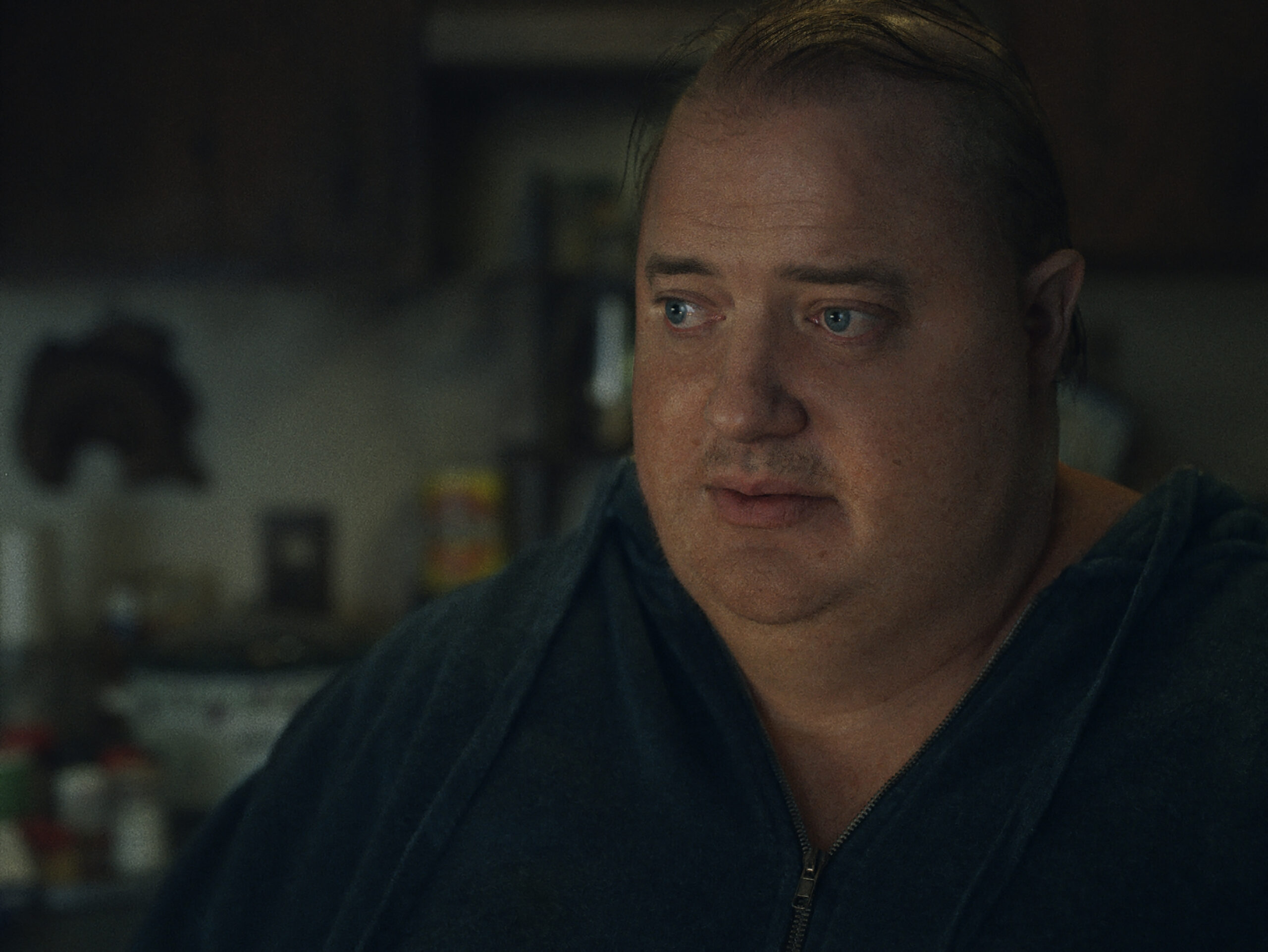The Whale
The Whale, 2022, 4 ¼ stars
A Whale of a film
Aronofsky serves up an all-you-can-eat drama
Exclusive to MeierMovies, December 3, 2022
Charlie lives alone in his shabby apartment. To pay his bills, he teaches online writing classes but never turns on his laptop camera, afraid to show himself to his students, for Charlie weighs 600 pounds. His drift into morbid obesity began after a personal, romantic tragedy and has accelerated into a death spiral, as he regularly consumes two large supreme pizzas in a single sitting and refuses to visit the hospital despite a blood-pressure reading in the 911 range. Practically immobile, he sports a flabby pannus hanging almost to his knees, like a deflated dirigible. Oh, the humanity.
Yet the title of director Darren Aronofsky’s latest drama, The Whale, refers not as much to the main character’s bulk as to his strange fascination with an essay on Herman Melville’s Moby-Dick. Maybe he just likes the essay, or maybe he realizes he’s doomed to chase his own white whale. That whale might be the destructive force of his eating disorder combined with his genetic predisposition to obesity, or it could be something deeper, either the aforementioned tragedy or his estrangement from his ex-wife and 17-year-old daughter, Ellie, with whom he’s trying to reconnect.
Shockingly, it’s Charlie who has a positive outlook on life, not Ellie, who has apparently indulged on a diet of hate and bitterness. Let that sink in: A depressed man approaching death remains an optimist while a young, attractive, intelligent teenager with her entire life ahead of her is a pessimist. “I hate everyone,” she says, while her dad proclaims, though tears of gratitude cried over those he loves, “People are incapable of not caring. People are amazing.”
This is all the work of Aronofsky and writer Samuel D. Hunter, who based the script on his 2012 play. Led by an astonishing, heartbreaking performance by Brendan Fraser, The Whale is one of the best films of the year, and perhaps the most emotionally challenging. Confined to a single, stagey setting and framed in the classic Academy aspect ratio of 1.33:1, the film allows its small supporting cast to shine, including Sadie Sink (Stranger Things) as Ellie, Hong Chau (Downsizing) as Charlie’s nurse and friend, Samantha Morton (Sweet and Lowdown, Minority Report) as his ex-wife and Ty Simpkins (Insidious) as a religious missionary who lends the story an odd spiritual touch. Credit is also due the graphically convincing work of the artists who designed Fraser’s prosthetic makeup, and composer Rob Simonsen, whose music is not particularly noticeable until you realize you’re crying partially because of that music, or, more precisely, the way it’s woven into the movie’s climax.
Ultimately, though, this is a triumph for Fraser, who probably deserves the Oscar, and for Aronofsky. With a resume ranging from the provocative and nightmarish (Black Swan and Mother!) to the gritty and disturbing (The Wrestler and Requiem for a Dream) to the arthouse brainteaser (The Fountain) to the Biblical (Noah), the director has shown an ability to surprise, inflame, frustrate and astonish, all while enjoying a fair amount of both critical and commercial success. He’s been able to have his π and eat it too.
With The Whale, Aronofsky and Charlie practically gorge, and their ravenous appetites feed our own hunger: a hunger for melodrama, empathy and truth. For after a while, we slowly begin to think like Charlie, who exhorts his students to abandon their formulaic essay bullshit and “just write me something fucking honest.”
In keeping with Charlie’s exhortation, let me throw out my own bit of fucking honesty: It doesn’t matter what you think of this review, or even whether you appreciate The Whale as art, or entertainment, or whatever you label it. What counts is what you do with your own life after seeing this powerfully human piece of filmmaking. Will you choose to emulate Charlie, or Ellie? And what will you feed your head?
© 2022 MeierMovies, LLC
For more information on this movie, visit IMDB and Wikipedia.
